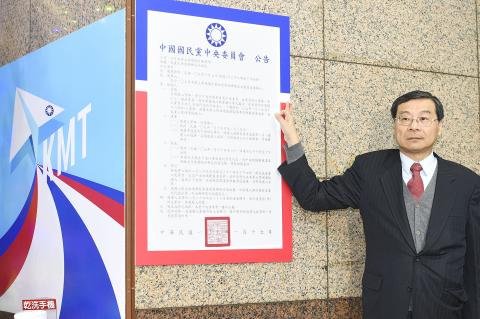The Chinese Nationalist Party (KMT) would decide whether to improve or abandon the so-called “1992 consensus” after considering the opinions of party members and the public, Acting KMT Secretary-General William Tseng (曾銘宗) said yesterday.
While many young party members have called for a revision of the KMT’s cross-strait policy, which is based on the so-called “1992 consensus,” whether the party should improve upon the concept or abandon it altogether is not up to the KMT chairperson and a handful of members, Tseng said at KMT headquarters in Taipei.
Before making a decision on the issue, the party must consider the opinions of all its members and those of the 23 million Taiwanese, he said.

Photo: George Tsorng, Taipei Times
“The KMT hopes to reflect the voice of the public,” Tseng said.
Tseng and KMT Central Standing Committee member Lin Rong-te (林榮德) on Wednesday were selected to be the party’s acting secretary-general and acting chairman respectively after former KMT chairman Wu Den-yih (吳敦義) stepped down earlier that day to shoulder responsibility for the party’s defeats in last Saturday’s presidential and legislative elections.
A new party chairperson and Central Standing Committee are to be elected on March 7.
During the transition period, the KMT would be simultaneously preparing for the elections and promoting reforms, Tseng said.
After some party members proposed holding forums to form a consensus about the party’s new direction or establishing special committees to lead reform efforts, Tseng said that the KMT is reviewing those suggestions.
“The KMT has no time to waste and will very soon propose strategies and methods for reforming the party,” he said. “We will not let our party members, Republic of China citizens and everyone else down.”
The KMT Central Standing Committee on Wednesday is expected to approve a new list of members, he said, adding that some members who had resigned would be urged to remain in their positions.
The members who stepped down with Wu included KMT vice chairmen Tseng Yung-chuan (曾永權) and Hau Lung-bin (郝龍斌), vice secretary-general Tu Chien-teh (杜建德), Administration and Management Committee director Chiu Da-chan (邱大展), Culture and Communications Committee director-general Cheng Mei-hua (程美華) and deputy secretary-general Alex Tsai (蔡正元).
KMT New Taipei City chapter head Lee Chien-lung (李乾龍) and Taipei chapter director Huang Lu Ching-ju (黃呂錦茹) also resigned following last Saturday’s elections.
The KMT is to accept registrations to run for chairperson on Feb. 3 and Feb. 4.
Under the party’s regulations, to qualify as a candidate a party member must collect signatures from at least 3 percent of KMT members before Feb. 4.
Those who have openly announced they plan to run include National Taiwan University political science professor Chang Ya-chung (張亞中) and Blue Sky Action Alliance convener Wu Chih-chang (武之璋).
The so-called “1992 consensus” — a term former Mainland Affairs Council chairman Su Chi (蘇起) in 2006 admitted making up in 2000 — refers to a tacit understanding between the KMT and the Chinese Communist Party that both sides of the Taiwan Strait acknowledge there is “one China,” with each side having its own interpretation of what “China” means.

CHANGING LANDSCAPE: Many of the part-time programs for educators were no longer needed, as many teachers obtain a graduate degree before joining the workforce, experts said Taiwanese universities this year canceled 86 programs, Ministry of Education data showed, with educators attributing the closures to the nation’s low birthrate as well as shifting trends. Fifty-three of the shuttered programs were part-time postgraduate degree programs, about 62 percent of the total, the most in the past five years, the data showed. National Taiwan Normal University (NTNU) discontinued the most part-time master’s programs, at 16: chemistry, life science, earth science, physics, fine arts, music, special education, health promotion and health education, educational psychology and counseling, education, design, Chinese as a second language, library and information sciences, mechatronics engineering, history, physical education

The High Prosecutors’ Office yesterday withdrew an appeal against the acquittal of a former bank manager 22 years after his death, marking Taiwan’s first instance of prosecutors rendering posthumous justice to a wrongfully convicted defendant. Chu Ching-en (諸慶恩) — formerly a manager at the Taipei branch of BNP Paribas — was in 1999 accused by Weng Mao-chung (翁茂鍾), then-president of Chia Her Industrial Co, of forging a request for a fixed deposit of US$10 million by I-Hwa Industrial Co, a subsidiary of Chia Her, which was used as collateral. Chu was ruled not guilty in the first trial, but was found guilty

Taiwan-based publisher Li Yanhe (李延賀) has been sentenced to three years in prison, fined 50,000 yuan (US$6,890) in personal assets and deprived political rights for one year for “inciting secession” in China, China's Taiwan Affairs Office spokesman Chen Binhua (陳斌華) said today. The Shanghai First Intermediate People’s Court announced the verdict on Feb. 17, Chen said. The trial was conducted lawfully, and in an open and fair manner, he said, adding that the verdict has since come into legal effect. The defendant reportedly admitted guilt and would appeal within the statutory appeal period, he said, adding that the defendant and his family have

DEADLOCK: As the commission is unable to forum a quorum to review license renewal applications, the channel operators are not at fault and can air past their license date The National Communications Commission (NCC) yesterday said that the Public Television Service (PTS) and 36 other television and radio broadcasters could continue airing, despite the commission’s inability to meet a quorum to review their license renewal applications. The licenses of PTS and the other channels are set to expire between this month and June. The National Communications Commission Organization Act (國家通訊傳播委員會組織法) stipulates that the commission must meet the mandated quorum of four to hold a valid meeting. The seven-member commission currently has only three commissioners. “We have informed the channel operators of the progress we have made in reviewing their license renewal applications, and